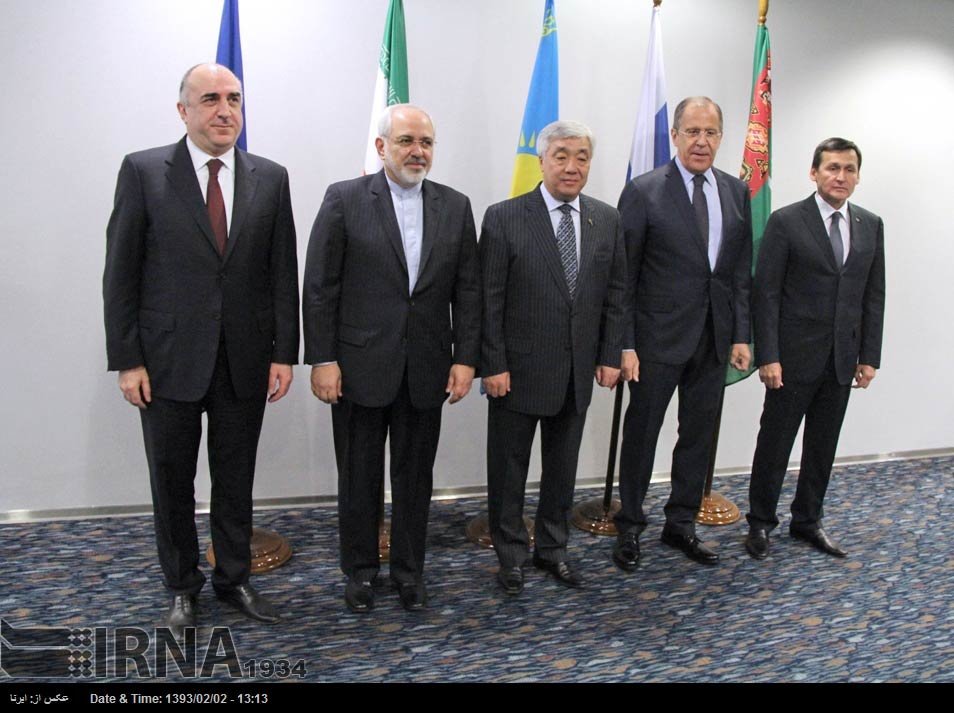No legal disagreement should remain about Caspian sea

MOSCOW _ The recent meeting of Foreign Ministers of the Neighboring Countries of the Sea in Moscow was held. Foreign Minister Dr. Mohammad Javad Zarif was present at this meeting. Russian Foreign Minister Sergei Lavrov also concluded at the end of the meeting and in a gathering of journalists that the final steps have been taken to formulate the legal regime of the Caspian Sea.
During this meeting, legal, economic, strategic and security cooperation between the Caspian Sea countries was discussed.
In general, in the case of the Caspian Sea, there are some points to note: Undoubtedly, the recent meeting of foreign ministers of the coastal Caspian countries is of great importance. The discussions at the meeting have shown that all five countries of Iran, Russia, Azerbaijan, Turkmenistan and Kazakhstan agree on a common understanding about the Caspian Sea. During the 6 meetings with the presence of foreign ministers of the countries along the coast of the Caspian Sea, many discussions were held. During these meetings, legal, security, economic and even cultural cooperation between the countries on the borderline of the Caspian Sea has been studied, and good agreements have been reached among the five countries.
However, as long as all disputes, especially legal disputes between the participating countries aren't settled, persistent and sustainable relations among the Caspian littoral states can't be established. In the recent meeting in Moscow, in addition to legal issues, economic and security issues and transportation in the Caspian Sea will be discussed. Foreign ministers from Iran and four other countries are trying to complete the statement of the fifth summit of the Caspian littoral states.
The negotiations between the Caspian littoral states based on good neighbor policy, shouldn't lead to ignoring the facts about the Caspian Sea. It should be noted that the infrastructure of settling disputes on the Caspian Sea and the resulting cooperation, relies on formulating the Convention of the Caspian Sea Legal Regime. Basically, an important part of the security and economic cooperation is a variable of formulating this convention. As long as the five Caspian littoral states aren't able to achieve a common legal understanding over the Caspian Sea, the scope of authorities and limitations of countries of the joint security and economic dealings is not to be determined.
In other words, the Convention on the Legal Status of the Caspian Sea can't be defined at the same level with the security and economic cooperation between the coastal countries. Undoubtedly, the definition of economic, security and even cultural cooperation between the Caspian littoral states is dependent on the settlement of legal disputes between the coastal countries of the Caspian Sea, as well as the establishment of a common legal regime. How to deal with security crises and defining the scope of fishing and interactions in the energy sector, are all issues that should be discussed after determining the limits of authority and ownership of each Caspian littoral state.
Undoubtedly, the prolongation of the process of resolving a case would not be undesirable if it would be due to a precise technical and legal examine of the issue. This is the case with regard to the legalization of the Caspian Sea Convention. After the collapse of the Soviet Union, we witnessed a kind of transformation in the Caspian legal regime. The Soviet Union was divided into several countries, and with its decay and collapse, Russia, Kazakhstan, Azerbaijan and Turkmenistan each became independent legal variables in this equation. Undoubtedly, the transformation of a two variable equation into a "legal-security" multi-variable equation is not a simple transformation.
Therefore, one should understand the complexities of the Caspian case. On the one hand, we are faced with the specific economic and security expectations of Caspian coastal players, and on the other hand, we're dealing with the demands and attemp
ts to gain more scores by some of the Caspian Sea neighbors. These made the "Caspian equation" complicated and difficult to a great extent.
In the years after the collapse of the Soviet Union, the Ministry of Foreign Affairs of our country has first and foremost tried to simplify this complex legal equation. In other words, Iran has taken two simultaneous strategies toward resolving the Caspian case: one transforms the Caspian case from a "geo-strategic knot" to a "negotiable case". And another, is the rational propound of Iran's demands, and the management of the other party's conduct. A focus on these two strategies shows that the Caspian Case is very complex.
As emphasized, the recent meeting of the Foreign Ministers of the Caspian littoral states in Moscow has been one of the most transparent meetings on the legal regime and economic and security relations between the countries neighboring the Caspian Sea. The very fact that today, the ministers of foreign affairs of the Caspian littoral states unanimously emphasize the need for the absence of foreign troops in this geographic region, is a positive and upward trend.
Similarly, regarding the statements made by the Foreign Ministers of the Caspian littoral states, it seems that they have accelerated their cooperation on resolving existing disputes. However, until all legal agreements between Caspian coastal states are resolved and the Convention on the Caspian Sea Legal regime is officially codified, we can't speak of the finalization of this legal and strategic case. Here it is emphasized that even one single legal disagreement should not remain among the players. Meanwhile, the mechanism for resolving disputes on the Caspian Sea should be carefully elaborated. Therefore, while welcoming the settlement of the existing disagreements over the Caspian Sea, it should not be expedited in completing this process. In such a situation, speaking of optimism or pessimism about the resolution of existing differences is no longer relevant.
